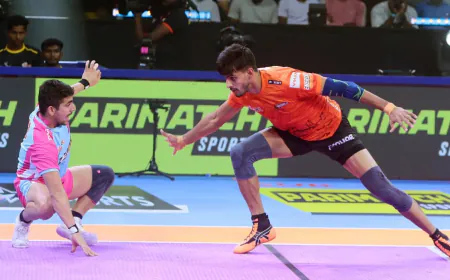Rohit Sharma's Early Departure-A Disastrous Start in the 1st ODI Against England
Rohit Sharma's early exit in the 1st ODI against England left India in a daze. The early dismissal of the Indian captain had sent out all the wrong signals for the match, and fans were worried. This article discusses how his early exit affected the team's performance and what it meant for India's strategy ahead.

In the first One Day International between India and England at the Vidarbha Cricket Association (VCA) Stadium in Nagpur, Rohit Sharma was dismissed for just 2 runs off 7 balls as his bad luck continued during the match. His early dismissal gave India a gloomy start to the match and added to the heat on his form, which was already under pressure following a dismal series in Australia during the Border-Gavaskar Trophy. The ODI series against England is important for Rohit Sharma, who has been under pressure to deliver big scores ahead of the Champions Trophy, with doubts over his place in the side.
Rohit's early dismissal was a tame shot that didn't trouble the bowler. The visibly distraught Rohit walked back to the pavilion, and this was a moment of deep frustration encapsulating what he has faced in recent times. The India captain was expected to lead from the front, but this performance fueled doubts about his future, making the upcoming matches in the series even more critical for his career.
India's Bowling Success in the First Innings
The Indian captain did not have much to smile about after the end result, but India's bowling, with debutant Harshit Rana and seasoned all-rounder Ravindra Jadeja, did the most talking about this Test. He was initially hit for 26 runs by an over by Phil Salt, but bounced back with aplomb, ending with a performance of 3 wickets for 53 runs. Jadeja, on the other hand, was exceptional with the ball, claiming 3 wickets for just 26 runs.
The England team, having been put in to bat first by India, made a solid start with an opening partnership of 75 runs before falling apart in the middle overs. Despite fifties from Jos Buttler (52) and Jacob Bethell (51), England's innings went into a shell after losing wickets in quick succession, courtesy tight bowling by India's attack. The hosts were successful in their efforts to reduce England to a total of 248 runs in 47.4 overs.
England's Strong Start with a Blip
England began confidently, racing to 50 for no loss in just 36 balls. However, pressure was soon able to be exerted by Indian bowlers; the turning point came when, after an early aggressive knock from Phil Salt who was run out after a mix-up with opening partner Ben Duckett, that ended Salt's quick-fire knock of 43 runs from 26 balls in which he hammered 4 sixes and 3 fours as England were seen at 75/1 after the ninth over.
Harshit Rana’s strong comeback continued, taking the wickets of Ben Duckett and Harry Brook in quick succession. Duckett was dismissed for just 6 runs, caught brilliantly by Jaiswal at mid-wicket off a rising short ball from Rana. Rana then followed it up with another bouncer to dismiss Harry Brook for a duck, leaving England in trouble at 77/3.
Buttler’s Lone Battle Against India’s Tight Bowling
With the loss of wickets at intervals, England's skipper Jos Buttler battled back with a composed half-century, facing 58 balls for his 52 runs. He was instrumental in cementing some good partnerships, thereby leading England into recovery. Buttler's innings consisted of singles and few twos, with a couple of boundaries off Kuldeep Yadav and Ravindra Jadeja. He had provided much-needed resistance to keep the scoreboard ticking for England.
However, Buttler's fight came to an end in the 37th over when he was dismissed by Axar Patel. Buttler tried to pull a low delivery, and in doing so, he ended up top-edging the ball straight into the hands of Hardik Pandya at short fine-leg. His 52-run knock, including four boundaries, was the backbone of England's innings after they were reduced to 111/4.
India extended their dominance on to the middle overs, with Jadeja and Rana maintaining the pressure. The wickets continued to tumble in regular intervals. Rana was third to get through Liam Livingstone for 5 runs with a short ball getting an edge off it. It meant at 183/6 in the 36th over, England couldn't be expected to make any sort of comeback to the game.
Mohammad Shami also chipped in with the wickets, as he dismissed Brydon Carse with a length ball that rattled the stumps. Bethell, who had already scored his half-century, was also dismissed by Jadeja for 51 runs and left England struggling at 206/7.
Jofra Archer tried his best to produce a late show, hitting a couple of boundaries and a six off Hardik Pandya but could not propel England past a competitive total. England was all out for 248 in 47.4 overs, but India will still be looking at a target which they would look comfortable with under the pitch conditions and the prospects of dew later in the evening.
India's Chase
India's batting line-up was set up for a chase, which was a manageable target ahead of them despite the early loss of Rohit Sharma. The conditions were expected to become difficult for the bowlers due to dew, and on a pitch that offered good pace and bounce, India would have fancied their chances. India now stood very firmly after England lost the first ODI but in the game it had already thrown open that huge scores and that from the team's skipper would play an important role for the rest of the series.
It will be interesting to see how Rohit Sharma can now bounce back from this early disappointment as the series progresses, keeping in view the next task at hand - the Champions Trophy - for his team's Indian captaincy. Performances such as this will have to be left behind for India if it is to succeed through the coming months.





















































